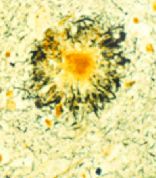
That’s fine as far as it goes, but what about those with advanced Alzheimer’s? Why not develop a more comprehensive approach?
If I might quote Paul Harvey, “here’s the rest of the story.”
Omega-3
- Might slow the cognitive decline (eg, perception, memory, judgment, and reasoning) in some people with very mild Alzheimer’s disease.
Diet
- Mediterranean diet is associated with a lower risk for Alzheimer’s disease.
- Avoid high dietary intake of copper in conjunction with a diet high in saturated and trans fats.
Music therapy
- Associated with reductions in activity disturbances, aggressiveness, and anxiety.
Art therapy
- The four A’s of Alzheimer’s (anxiety, aggression, agitation, and apathy) often fade in the presence of art.
Massage therapy
- Improves the management of behavioral, emotional, and perhaps other conditions associated with dementia.
Ginkgo biloba
- The German Commission E panel approves ginkgo for symptomatic treatment of “disturbed performance in organic brain syndrome.”
- National Institutes of Health and the National Center for Complementary and Alternative Medicine will complete their study in about 3 years.
Aromatherapy, bright light therapy, reminiscence therapy, cognitive training, psychological interventions
- There is some supporting evidence according to the British Association for Psychopharmacology.
Exercise
- Tai chi modified for seniors lowers the risk of falls and related injuries.
- Taking seniors out of their familiar environment to treat them for broken bones accelerates or reveals their tenuous hold on independence.
Admittedly, the supporting data are limited, but we are talking about people who will spend years trapped within themselves. Are these recommendations dangerous? Is there any evidence that they accelerate mental decline?
The answer is no. And considering the limitations of existing mainstream therapy, these options consider support by the experts and the healthcare community at large.
Particularly in patients with advanced disease, a comprehensive program that provides any improvement in quality of life should be used.
11/3/06 10:51 JR